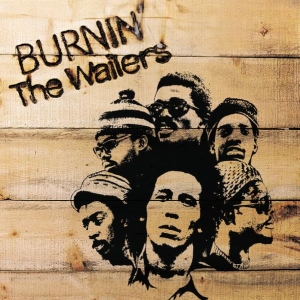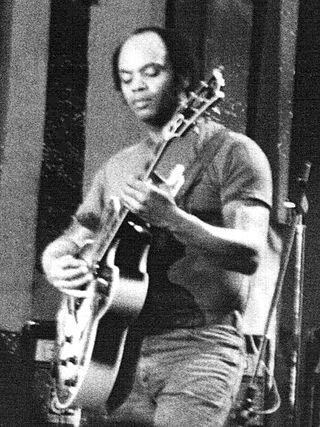
Reggae is a music genre that originated in Jamaica in the late 1960s. The term also denotes the modern popular music of Jamaica and its diaspora. A 1968 single by Toots and the Maytals, "Do the Reggay", was the first popular song to use the word reggae, effectively naming the genre and introducing it to a global audience. While sometimes used in a broad sense to refer to most types of popular Jamaican dance music, the term reggae more properly denotes a particular music style that was strongly influenced by traditional mento as well as by American jazz and rhythm and blues, and evolved out of the earlier genres ska and rocksteady. Reggae usually relates news, social gossip, and political commentary. It is instantly recognizable from the counterpoint between the bass and drum downbeat and the offbeat rhythm section. The immediate origins of reggae were in ska and rocksteady; from the latter, reggae took over the use of the bass as a percussion instrument.

Burnin' is the sixth album by Jamaican reggae group the Wailers, released in October 1973. It was written by all three members and recorded and produced by the Wailers in Jamaica, contemporaneously with tracks from the Catch a Fire album with further recording, mixing and completion while on the Catch a Fire tour in London. It contains the song "I Shot the Sheriff". It was the last album before Marley, Peter Tosh and Bunny Wailer decided to pursue solo careers, while continuing their local releases through their company Tuff Gong Records. A commercial and critical success in the United States, Burnin' was certified Gold and later added to the National Recording Registry, with the Library of Congress deeming it historically and culturally significant.

Bob Marley and the Wailers were a Jamaican ska, rocksteady and reggae band. The founding members, in 1963, were Bob Marley, Peter Tosh, and Bunny Wailer.
Joseph Benjamin Higgs was a reggae musician from Jamaica. In the late 1950s and 1960s he was part of the duo Higgs and Wilson together with Roy Wilson. He was a popular artist in Jamaica for four decades and is also known for his work tutoring younger musicians including Bob Marley and the Wailers and Jimmy Cliff.
Delroy George Wilson CD was a Jamaican ska, rocksteady and reggae singer. Wilson is often regarded as Jamaica's first child star, having first found success as a teenager. His youngest son, Karl "Konan" Wilson, has found success as part of British duo Krept and Konan.

Michael Chung also known as Mao Chung, was a Jamaican musician who played keyboards, guitar and percussion instruments. He was also an arranger and record producer of Jamaican music, and worked with a wide array of musicians, notably Lee Perry and Sly and Robbie.

Bush Doctor is the third studio album by Jamaican reggae singer Peter Tosh. It was released in 1978 on Rolling Stones Records. The album features Mick Jagger as guest vocalist on one song, while Keith Richards plays guitar on two tracks. The rhythm section featured Sly and Robbie.

Mystic Man is the fourth studio album by Peter Tosh. All songs were composed by Peter Tosh. It was released in 1979 by Rolling Stones Records, EMI, and Intel Diplo.

Soul Rebels is the second studio album by the Wailers, their first album to be released outside Jamaica. The Wailers approached producer Lee "Scratch" Perry in August 1970 to record an entire album, and the sessions took place at Randy's recording studio above Randy's Record Mart at 17 North Parade in Kingston, Jamaica, until November. First issued in the UK by Trojan Records in December 1970, the album has since been re-released several times on several different labels. Perry's production is sparse and haunting, only featuring guitar, bass, drums, electronic organs, and vocals with no horns or other embellishments.

Throw Down Your Arms is the seventh studio album by Sinéad O'Connor, also known as her reggae album. O'Connor sings cover versions of classic roots reggae songs, with production by Sly and Robbie.

No Nuclear War is the seventh and final studio album by the Jamaican musician Peter Tosh, released in 1987. Tosh was murdered shortly after its release; he had returned to Jamaica after meetings in New York City to discuss the lack of promotion for the album. Tosh was also upset that, despite the language in his contract with EMI Records, the album had been released in South Africa. Before recording No Nuclear War, Tosh had spent four years protesting elements of his record contract.

Leroy Sibbles is a Jamaican reggae musician and producer. He was the lead singer for The Heptones in the 1960s and 1970s.

Eric Gale was an American jazz and R&B guitarist.

Earl "Chinna" Smith, a.k.a. Earl Flute and Melchezidek the High Priest, is a Jamaican guitarist active since the late 1960s. He is most well known for his work with the Soul Syndicate band and as guitarist for Bob Marley & the Wailers, among others, and has recorded with many reggae artists, appearing on more than 500 albums.

Blackheart Man is the debut album by Bunny Wailer, originally released on 8 September 1976, in Jamaica on Solomonic Records and internationally on Island Records.
John Masouri is one of the world's foremost reggae music journalist. He's also an author, reviewer and historian for Jamaican music and several of its musical offshoots including dub, roots and dancehall.

Fitzroy Edwards, better known by his stage name Edi Fitzroy, was a Jamaican reggae singer, active from 1975 but best known for his work during the dancehall era.
"007 (Shanty Town)" is a 1967 rocksteady song by Jamaican band Desmond Dekker and the Aces, released as a single from their debut album of the same name. It was also a hit for Musical Youth in 1983. "007 (Shanty Town)" has been called "the most enduring and archetypal" rude boy song. Its title and lyrics refer to the cool imagery of films such as the James Bond series and Ocean's 11, admired by "rudies".

Neville O'Riley Livingston, known professionally as Bunny Wailer, was a Jamaican singer-songwriter and percussionist. He was an original member of reggae group The Wailers along with Bob Marley and Peter Tosh. A three-time Grammy Award winner, he is considered one of the longtime standard-bearers of reggae music. He was also known as Jah B, Bunny O'Riley, and Bunny Livingston.

Winston Hubert McIntosh, OM, professionally known as Peter Tosh, was a Jamaican reggae musician. Along with Bob Marley and Bunny Wailer, he was one of the principal members of the band the Wailers (1963–1976), after which he established himself as a successful solo artist and a promoter of Rastafari. He was murdered in 1987 during a home invasion.















